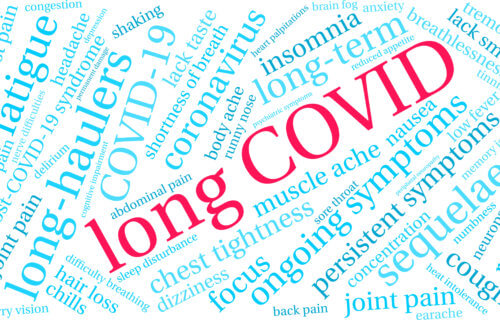LISBON, Portugal — As the coronavirus pandemic drags on, a new study finds “long COVID” is dragging on as well. Researchers in Luxembourg have found that more than half of the patients dealing with long COVID still experience symptoms a full year after their initial infection.
Researcher Aurelie Fischer and a team at the Luxembourg Institute of Health surveyed nearly 300 former COVID patients, checking on each of their lingering symptoms after they recovered from the virus. Previous studies have uncovered roughly 200 different ailments which continue to plague COVID patients for weeks and even months after a coronavirus infection. Overall, 25 to 40 percent of the COVID patients go on to develop long COVID.
The new study found six in 10 people (59.5%) still had at least one long COVID symptom a year after testing positive for COVID-19. The most common lingering symptoms are fatigue, shortness of breath, and irritability.
Moreover, the team found that if a long COVID patient continued to experience a particular symptom for at least 15 weeks (roughly four months), that symptom stuck with them for the rest of the year.
Severe COVID cases led to more lingering symptoms
Study authors also split these participants into three groups, according to their initial infection severity (asymptomatic, mild, and moderate-to-severe). This distinction revealed that patients with a moderate or severe case of COVID-19 were twice as likely to suffer from long COVID one year later. Having a severe case of COVID also made it more likely that patients would experience sleep problems a year later in comparison to asymptomatic patients (63.8% vs. 38.6%)
“We observed a gradient between COVID-19 severity at inclusion and frequency of long COVID at one year. Participants with a mild form of the acute illness were more likely than those who’d been asymptomatic to have at least one symptom at one year, and to have sleep problems, but to a lesser extent than those with a moderate or severe acute illness,” says Fischer in a media release.
Patients are not coping with long COVID well
The team’s questionnaire on long COVID symptoms revealed one-third continued to experience fatigue one year later (34%), respiratory symptoms affecting quality of life (13%), and sleep issues (54%). One in seven respondents add they don’t believe they’ll be able to cope with their long COVID symptoms long-term.
“Our study offers a detailed description of symptoms persisting one year after COVID-19, according to the initial disease severity. It shows that long COVID can still have a large impact on quality of life, even a year after the acute infection. In general, the more severe the acute illness is, the more likely someone is to have ongoing symptoms; however, those with an asymptomatic or mild initial infection may also experience a deterioration in their quality of life,” Fischer concludes.
“We also highlighted that long COVID likely consists of multiple sub-categories, distinguished by particular combinations of symptoms. Finally, this work will help raise awareness of the needs of people with long COVID and contribute to the development of health strategies to help them.”
The team presented their findings at this year’s European Congress of Clinical Microbiology & Infectious Diseases (ECCMID).

I have battled long haul Covid for 13 months now. I hit a plateau at 11 months, where there was no improvement such as available energy and the ability to breathe without heaving in and out. I am also down to one kidney, and that is operating at about 50 percent. I did some research on possibly protecting existing kidney function, or even increasing its function. I was directed to one of the major mushrooms and/or fungus that the Chinese have used for 2000 years. It is called Cordyceps Militaris. I bought 3 bottles, relatively cheap and plentiful. Within 3 days, I noticed my dry eyes were more moist. I also noticed the Tinnitis in my ears has diminished. But the greatest change is that I am no longer winded when doing anything physical! My energy level and endurance even seems to be greater than before Covid. I am astonished! Why is this result not being reported? An internet search does not show hardly any information of a link between Long Haul Covid and Cordyceps. I have made 2 inquiries to the University Of Michigan Covid Research, and as of yet, no response. I cannot say that this will do such a miracle for others who suffer, but it needs to be tried out! I am not a doctor, but one of the stated benefits of Cordyceps is that it helps our body cells to absorb more oxygen. My blood oxygen has been 96 percent and above, yet I just could not shake the tiredness, excessive sleeping, heaving when breathing, etc. I am convinced that Cordyceps has allowed my body cells to absorb more oxygen that is in oxygenated blood. I feel like the person who has found a hidden treasure, and want to share that treasure (Cordyceps Militaris) with my fellow LHC sufferers.
I’ve had covid 4 times…my throat is killing me..no energy…crazy headaches…fatigued basically all that time. I sleep well…but the inflammation is off the charts.. Went to a ENT..he said my throat is fine…blood work comes back normal.
I eat crayons, it helps to fight covid